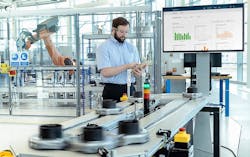Ask Lawrence Whittle how to attract talent to the manufacturing sector and he answers with one word – education.
As CEO of Parsable, a provider of digital tools to connect workers, and an active member of the World Economic Forum, he is passionate about uplifting the public perception of manufacturing which will, in turn, lead to attracting future workers to the field.
The sector did get a recent boost as it kept the world moving forward while fighting a pandemic. “It’s an exciting time in the field and the industry should ride the wave of positive perceptions earned from the country realizing how essential manufacturing was, and in particular how important front-line workers are,” Whittle says.
A survey released on July 28 by Parsable supports his view as 56% of the Gen Z respondents said their views have changed toward the field with 77% saying they viewed the industry as more important.
“We have to harness this momentum as the labor shortage is at a critical level,” he notes citing the example of a CEO that supplies components to the auto industry saying that they are 30% down on their front-line workers.
But there still is a long way to go to turn this sentiment into filling actual jobs. The report found that 54% had not considered frontline manufacturing before the pandemic, but of that group, 24% are open to exploring it. Aiding this exploration is providing education both about the field and its’ career opportunities.
In the U.S., the survey found that while 47% of GenZ does find career inspiration from their family, 55% do not know anyone who works in manufacturing. Even without the first-hand experience, a healthy number, 59% said they might have been interested in manufacturing if they had access to related programs while in school; however, more than half (53%) cited not having such access.
So where to start? A good place is the untapped pool of workers who are not considering further education either past high school or past community college. “In many manufacturing roles you do not need a four-year degree,” Whittle points out. “You can start with a two-year degree and enhance training. And training using the technology that is available now is easier. We can capture the knowledge from more experienced workers to new ones. It takes less time, which is important as this generation won’t stay at jobs as long so needs to be trained more quickly. And using this technology is more natural to this generation.”
Technology can also address another very important mismatch that is blocking entry into the field and that is pay levels. As workers are trained more quickly, they can become more productive and thus more profitable, which in turn can give companies the room to increase salaries. Pay is an issue as 41% of those surveyed think the field doesn’t pay well and 64% cited that factor as a top priority in choosing careers. This group believes that manufacturing pays less than other industries but according to a survey from Glassdoor, entry-level pay across all industries is around $40,000 while entry-level (up to one year of experience) in manufacturing pay is at $60,000. But seeing pay from a survey, and finding those positions isn’t always possible with pay very low in some areas and higher now due to the shortage.
“Companies are realizing that they have to increase pay,” says Whittle. “With the new efficiencies that technology brings they are able to do this, as traditionally these jobs were inefficient, so lower pay was the way to cover that inefficiency. That’s not the case now.”
Another reason to justify high pay arises as automation takes the jobs less suited to people, leaving them open to better jobs. “Digital technology now enables people to be trained both in standard work, but also in cross-training which is important for career development,” Whittle says. “In the past, you would stay in a role for many years, but with cross-training, you can learn different skills and advance your career within a company, and career advancement is important to this next generation.”
Also important to this next generation are the issues of sustainability and that is something that Whittle works on a lot as part of his role in the World Economic Forum (WEF). “Even prior to the pandemic the WEF was focused on sustainability and the future of work,” explains Whittle. “The two are tied together. As the Millennials will be the dominant leaders by 2025, the call for a more sustainable way of doing business will increase in importance. And most of the issues in climate change involve large industrial companies. So, this is both a risk and an opportunity for the manufacturing sector. As companies become more sustainable it will create a better image for the field which can then harness the enthusiasm of the younger workforce which views sustainability as the way to a better world.”
To bring these issues together the WEF has a program called the New Generation Industry leaders, which is aimed at providing opportunities for emerging leaders to join the manufacturing field.
“Manufacturing is just an ideal career in that it provides valuable products to the world and at the end of the day people want to feel that the work they are doing is important and contributes to the benefit of society,” says Whittle. “To be able to do that in a field that can offer a long-term career, with continuing education is the message that we must convey to educators, students, potential employees and really society at large.”
About the Author
Adrienne Selko
Sr. Editor
Focus: Workforce, Talent
Email: [email protected]
Follow Me on Twitter: @ASelkoIW
Senior Editor Adrienne Selko has written about many topics over the 17 years she has been with the publication and currently focuses on workforce development strategies. She is also a senior editor at Material Handling & Logistics and EHS Today.
Previously Adrienne was in corporate communications at a medical manufacturing company as well as a large regional bank.
She is the author of Do I Have to Wear Garlic Around My Neck?, which made the Cleveland Plain Dealer's best sellers list.

